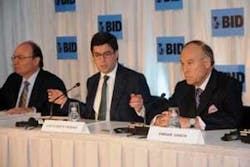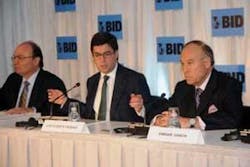IDB Grants to Jump-Start Water & Sanitation Programs
With up to $35 million a year in potential grants, the Inter-American Development Bank’s new Aquafund will finance project preparation and technical assistance to develop solutions for pressing water and sanitation problems.
Latin American and Caribbean governments that want to improve water and sanitation services can now apply for grants from the Aquafund, a new source of financing approved Sept. 19 by the board of the Washington, DC-based Inter-American Development Bank.
The Aquafund is a fast-disbursing vehicle to help accelerate project development in the water, sanitation and solid waste disposal sectors. It can be used to finance activities ranging from pre-feasibility studies to technical training and knowledge dissemination, depending on local needs.
“There are many innovative proposals for improving water and sanitation services in Latin America today,” said IDB President Luis Alberto Moreno. “Aquafund was created to help make those proposals a reality by financing the early stages of project preparation, and also to help replicate successful experiences on a larger scale.”
During the rest of 2008, the fund could disburse up to $15 million in grants from the IDB’s ordinary capital. Starting in 2009, the fund – which also can receive contributions from private sources – will mobilize matching contributions from multiple donor countries, providing up to $35 million in grants during the calendar year.
These grants can be used to support projects that subsequently receive both loans with either sovereign or non-sovereign guarantees. It’s expected to finance activities such as improvements in the legal and regulatory framework, water resource management, and capacity building at municipal, state and national level. The grants also will be available directly to water, sanitation and solid waster service operators.
“We expect Aquafund to be a catalyst for innovative approaches to these areas,” said Federico Basañes, chief of IDB’s Water and Sanitation Division. “We have set ourselves the goal of financing projects with 100 of the region’s cities and 3,000 of its rural communities by 2011, and Aquafund is going to be a key resource for municipalities that need help getting projects off the ground.”
Starting in 2009, the Aquafund will use contributions from donors to finance pilot investment projects using new technologies with potential for replication. Donor funds also can be used for investment in projects on service expansion in low-income urban and rural communities, household connections to water and sanitation networks, wastewater treatment and solid waste disposal.
For more information on IADB or the Aquafund, contact Corinne Cathalá – +1 (202) 623-2759 or visit: www.iadb.org
New Liquidity Funds
Responding to the global financial crisis, the Inter-American Development Bank (IDB) said Oct. 13 it plans to approve a record volume of loans in 2009 – $12 billion up from $10 billion in 2008 – and is setting up a new fast-disbursing $6 billion liquidity facility – Liquidity Program for Growth Sustainability – to help Latin American & Caribbean nations sustain economic growth.
In addition, the Andean Development Corp. (CAF) announced a contingency credit line of $1.5 billion and the Latin American Fund of Reserves (FLAR) offered $1.8 billion as part of its liquidity arrangements to support countries facing difficulty accessing capital markets. FLAR also could add $2.7 billion more through contingency lines to support balance of payments, depending on how market conditions evolve.
CAF Executive President Enrique García said it’s also raising credit lines for financial institutions in its 17 member nations from $1.5 billion to $2 billion. With these increases and other more traditional loans and financing tools, he expects approvals up to $16 billion in 2008-09.
The IDB is leading a coordination effort with other multilateral institutions like the World Bank, International Finance Corp., CAF, Caribbean Development Bank and FLAR to ensure resources are provided quickly.

